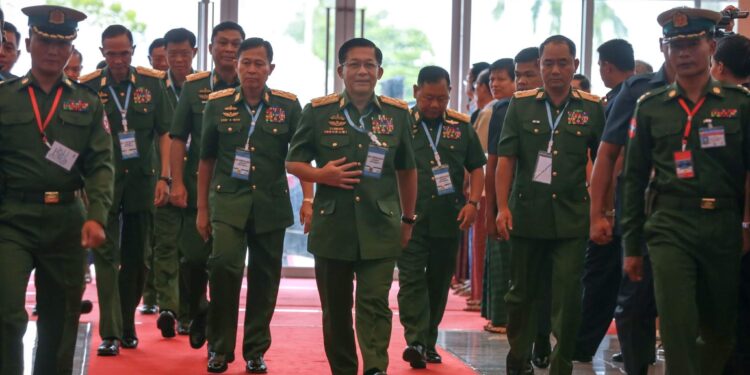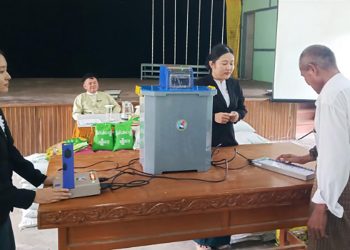YANGON—The Myanmar military has warned that the civilian government led by the National League for Democracy (NLD) will be responsible for any irregularities committed by the election commission, and blamed ethnic people’s loss of voting rights in certain areas on disturbances and pressures caused by ethnic armed organizations.
Six days prior to the election, the office of the Commander-in-Chief of Defense Services on Monday issued two statements relating to the upcoming election, one referring to the government and the Union Election Commission (UEC), and the other discussing ethnic armed organizations (EAOs).
In the statement on the government and UEC, the military accused the commission of incompetence, particularly regarding voter list errors, disputes and complaints relating to early voting, and what it said was weakness in the agency’s supervision of political party campaigns amid the COVID-19 outbreak.
The statement came in the wake of criticism of the UEC from political parties and observers in recent months for various reasons including its handling of early voting by nationals overseas, censorship of political parties’ speeches on state media and the cancellation of voting in areas dominated by ethnic minorities.
The military said that by contrast, the elections in 2010 and 2015 were free and fair, adding that the upcoming 2020 election was falling short in this regard.
In its English-language statement, the military warned that “weakness and deficiencies which were never seen in the previous elections are appearing now. They can have adverse impacts on the image of the election.”
The military added that “criticisms about the freeness and fairness of [the] election [are] rather directed not at the commission but at the government,” which it said is legally responsible for the commission’s actions.
It warned that “the government has the complete responsibility for all the intentional and unintentional mistakes of the commission at its different levels.”
The military said that despite the fact that the UEC had more than four years to prepare for the upcoming election, there had been widespread violations of laws and procedures during the pre-voting process, according to statements from political parties and media reports, adding that information about the situation in remote areas where transportation was difficult had been hard to obtain.
“There is much weakness even in arranging envelopes for votes and ballot boxes,” the Office of the Commander-in-Chief said.
The military said it had learned that the UEC even faced difficulties in counting the number of eligible voters, and made a lot of careless mistakes in compiling the voter lists.
It pointed out that the UEC had issued statements exceeding its authority under existing laws, on the pretext of protecting voting rights, causing the public to doubt it.
It expressed doubt about the activities of the commission, which was formed by the government.
In early October, the UEC allowed citizens to vote in advance if they are unable to return to their constituencies due to COVID-19 restrictions, or if they are over 60 and living in townships under stay-at-home orders or with dense populations.
The military said it also found that negative outcomes were caused by the election body’s loose supervision of political parties, which failed to observe the rules and regulations relating to COVID-19 during the election campaign. But it did not specify the negative outcomes.
It said the government is required “to conduct systematic and correct supervision on the performance of duties by the commission to hold free and fair elections.”
In response to the military statement, the spokesperson for the NLD, Dr. Myo Nyunt, said that UEC is doing its best, although there are some weaknesses. He said that the NLD government can only oversee the commission according to the law, as it is an independent body.
Dr. Myo Nyunt said he had expected such a statement from the military, citing the meeting between Senior General Min Aung Hlaing and 34 political parties in August.
The meeting was organized by Myanmar’s former ruling party, and military proxy, the Union Solidarity and Development Party (USDP). The majority of the participants were parties considered pro-military and USDP allies. During the meeting, they sought Snr-Gen Min Aung Hlaing’s assurance that the military would help them if the voting turned unfair.
“If we really want democracy in our country, we must welcome any government that will win the upcoming election through a free and fair vote,” Dr. Myo Nyunt said.
“We all want the election to be free and fair. It is a must and very important. We will hold the election in accordance with law. We will ask our party members and supporters to follow the law and also our election rivals to follow the [election] law,” Dr. Myo Nyunt added.
In a separate statement, the military said the EAOs’ activities were to blame for delays in the peace process and the loss of voting rights by ethnic people in some areas. Referring to the cancellation of voting in ethnic areas, the military said it was possible that by-elections might be held in the near future in areas where the voting cannot be held on Nov. 8.
It warned EAOs that in order for an election to be held in the near future, EAOs needed to avoid taking up positions and moving through areas not related to them and to leave such areas as soon as possible.
Gumgrawng Awng Hkam, Central Executive Committee member and vice president of the popular Kachin State People’s Party (KSPP), told The Irrawaddy that the statement from the military seemed to be a threat against the peaceful democratic transition of the country through holding legitimate elections.
He said that while there were weaknesses in the way the NLD government and the UEC had handled the election process, simply casting blame was not the right move by the military and would not help national reconciliation.
Awng Hkam said that national reconciliation is vital to establishing a democratic federal union, adding that the ruling NLD, the military and the political parties need to understand each other, so that the country stays on the path to democracy.
“For democracy to thrive, we must have an election to choose the government the democratic way. This needs to be accepted by the military,” he added.
“The election is just days away. So it would be best to sit together and find a way to move forward to build a federal union after the election,” Awng Hkam stressed.
You may also like these stories:
Myanmar Party Poll Monitors Complain of Election Law Violations During Early Voting
As Myanmar’s Election Approaches, Former Military Officials Hope to Rebound in Naypyitaw

















